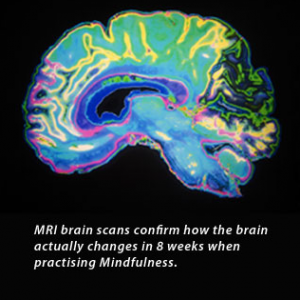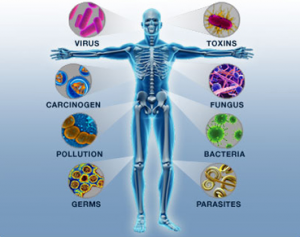
An Introduction to the Hottest Anxiety-Buster in London Town
If you are wondering what this ‘mindfulness-thing’ that everyone has been talking about actually is, and if you want to learn what it can do for you, then read on. You can then try out different mindfulness techniques using the scripts and exercises available on our resources page.
The Scientific Evidence
Mindfulness originates from Zen Buddhist philosophy, but it has recently become a very hot topic in western psychology. Currently, there is a lot of excitement and activity around mindfulness in the scientific community and research has proven that mindfulness can dramatically improve our wellbeing and performance in many areas of our modern and busy lives.
Research has shown how mindfulness practice can actually change areas of the brain associated with learning, memory, regulating emotions and perspective taking. In one research study, brain scans were taken of participants before and after an eight week Mindfulness Based Stress Reduction (MBSR) program. Compared to people who had not completed the program, researchers found increases in key areas of the brain associated with learning and memory processes as well as the ability to take on different perspectives. Since we all use our learning and memory regularly, whether it is remembering the keys on the way to work or learning to use a new computer system, research demonstrates the effectiveness of using mindfulness to aid vital brain processes.
One thing that we always ask our clients is when was the last time you read a full market wrap,
from start to finish, and in a fully focussed manner? What’s really surprising is the amount of people
who hadn’t actually noticed that they skip from one half done thing to another!
Research has shown how attention and concentration can be improved with the use of mindfulness, helping to improve focus and lessen the impact of distractions. It can also help us with our communication skills, helping us to hold back from knee-jerk negative reactions and consider in a more balanced way how we may like to respond in times of conflict.
We all experience stress within our everyday lives, from upcoming deadlines or managing a busy household, and at times we may feel overwhelmed. Mindfulness researchers have shown that those who practice mindfulness tend to use more helpful coping strategies when in stressful situations. And even when your stress comes from something as scary as cancer, mindfulness has been shown to help people to manage and reduce their stress levels.
Changing the Structure of our Brains
 So, why do we experience improved well-being after being ‘mindful’? Neurobiological
So, why do we experience improved well-being after being ‘mindful’? Neurobiological
changes within the brain may provide an explanation. Research into the brain’s electrical signals has shown that on-going mindfulness practice is associated with increased alpha wave activity, linked to improved relaxation and decreased anxiety. Using brain scan technology, scientists have also shown that structural changes also occur in the brain after mindfulness practice, creating increased connections between different areas of the brain and an increase in a protective nerve tissue called myelin. Myelin serves to insulate the electrical pathways in our brains, making them more efficient in their communications.
Even short sessions of mindfulness have been evidenced to cause neurobiological changes, and these beneficial effects increase in line with the increasing frequency that these skills are put into practice. In fact, research indicates that people who build mindfulness into their day-to-day lives gain more benefit than those who only set aside time to do longer closed eye exercises. Mindfulness is about a stance we take towards our lives, moment to moment, versus something we only call on in response to stress.
Mindfulness and the Immune Response
Not only does the use of mindfulness have benefits for our minds, but there has also been growing evidence supporting the use of mindfulness for improved physical health. Illness is something we all try to minimise in our lives, and mindfulness may help you to do that! Research has shown that even after eight weeks of mindfulness, people experienced changes in immune functioning with a greater antibody count. Mindfulness practice can even help you manage pain. After a period of mindfulness practice, participants in research studies report lower pain intensity experiences, both in the laboratory and in real-life chronic conditions such as arthritis and back and neck pain.
Research has shown that even after eight weeks of mindfulness, people experienced changes in immune functioning with a greater antibody count. Mindfulness practice can even help you manage pain. After a period of mindfulness practice, participants in research studies report lower pain intensity experiences, both in the laboratory and in real-life chronic conditions such as arthritis and back and neck pain.
So what is Mindfulness?
In essence, mindfulness is the practice of cultivating awareness of the present, moment-to-moment, by paying attention in a particular way, purposefully and non-judgmentally. The practice of mindfulness strengthens our ability to move from unhealthy ‘autopilot’ states of mind (such as: worry, rumination) that may also lead us to miss out on meaningful experiences in life.
In order to develop these skills, mindfulness utilises specific techniques to ground attention, improve focus, develop insight and increase self-acceptance. Developing this capacity for self-awareness and reflectivity is the antithesis of the fight or flight response mentioned in our earlier blog. Becoming more in tune with our thoughts, feelings and behaviours helps us to align our busy minds with our bodies, allowing for greater understanding and more choice in the way we live and work. Rather than being a slave to the millions of thoughts and feelings we have in everyday life, with very little in the way of focus, we can learn to observe these internal antics and choose what to put our energy into. From a workplace point of view, it allows us to maintain our strategic focus, resisting the push and pull of our adrenaline filled, chaotic environments.
If you think about it, all our stress in any moment of our life is a consequence of all the thoughts in our mind! When stressed, you may be thinking about the past or worrying about the future, ruminating on the things you should or shouldn’t have done, or that you could have done better. We often meet clients who spend their time both over-preparing for meetings and over analysing their performances afterwards – and all at the expense of being in the moment and attending to the things happening right under their noses! It is the ability to be present in the moment that leads to performance, something which our British Olympic athletes have used to win countless gold medals. Imagine being able to notice when you begin to over-prepare, or when you engage in hours of post hoc circular thinking, imagine you have techniques to allow you to refocus – think of how much anxiety and grief you might be able to avoid!
Mindfulness practices take many forms but essentially all of them share elements of cultivating a disciplined development of awareness – or you could say, the development of ‘focused attention’ on the present moment and seeing and experiencing that moment just how it is, without aversion or judgement. Awareness is available to you 24/7, when playing poker, making a trade or spending quality time on the weekends with your children – wherever you are or whatever you are doing, it’s always there.
Check out our resources page to get some great ideas to help you start practicing mindfulness today!
